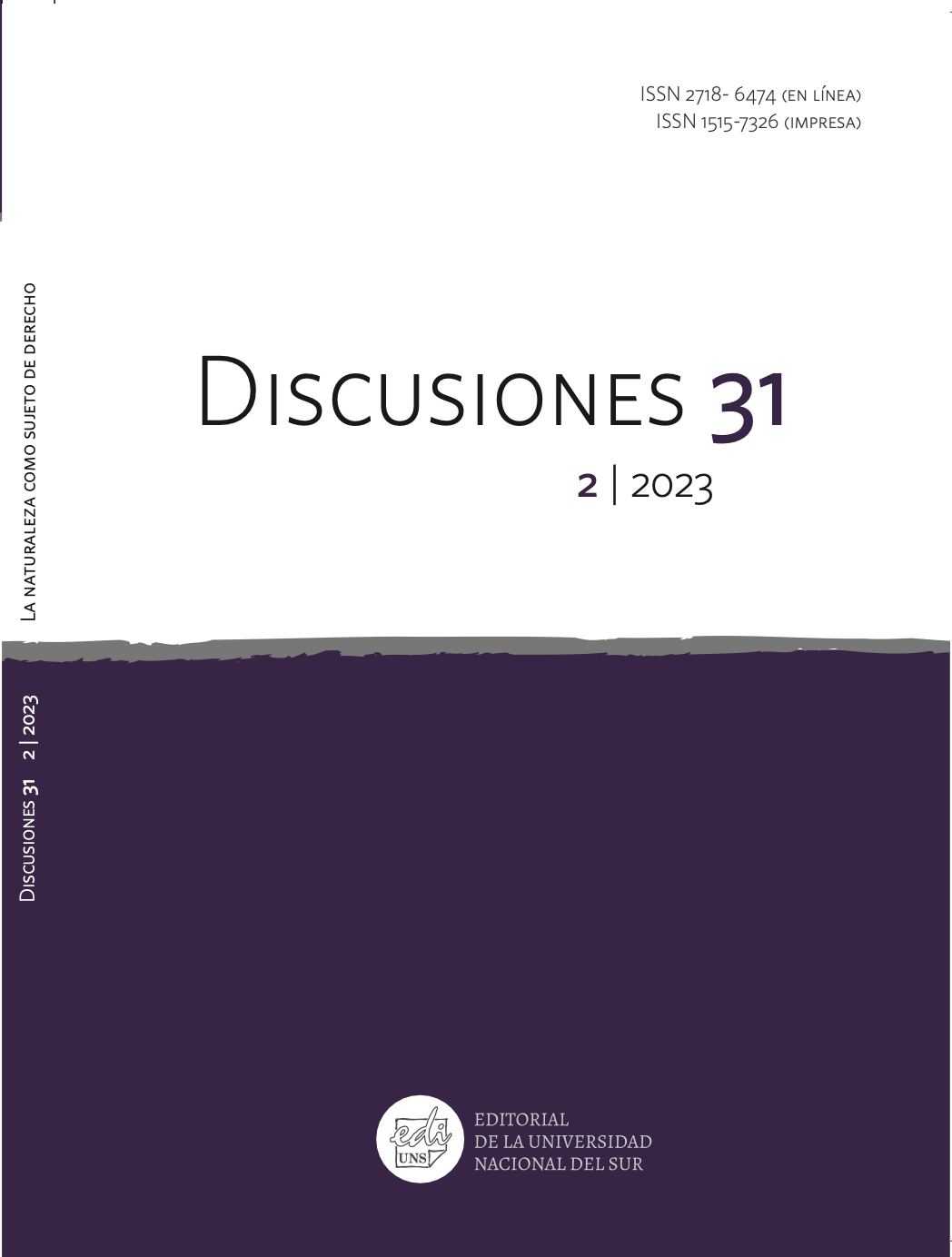Solidarity, of What and among Whom? Regarding the Debate on the Justification of Taxation and Public Spending
DOI:
https://doi.org/10.52292/j.dsc.2023.3819Keywords:
Taxes, Tax justice, Public spending, Postkeynesianism, MarxismAbstract
Debates on the foundations of taxation, addressed in a past issue of Discusiones, normally focus in strictly normative aspects thereof, but some premises deriving from the neoclassical theory are usually taken uncritically in regards to material features of taxes. In particular, debates often assume that taxes are a previous condition of public spending. However, other theoretical frameworks differ from the neoclassical theory, such as postkeynesianism, propose that taxes are not a previous requirement of public spending, but a tool to control the monetary mass, thus disappearing or mitigating the weight of the factual reasons to support taxation in general. Public spending, considered solely, takes a central role in structuring a solidarity purpose of public finance. Redistribution through taxes is factually feasible within a postkeynesian theoretical framework, but that depends on two theoretical factors that the normative purposes on taxes often ignore: the tax shifting and the tax incidence. If such factors are taken into account, the foundation of one or more taxes does not stem from their external legal structure, but from the feature of not having an incidence on low income people. Strictly speaking, the debate on “tax justice” should be only a part of a broader debate on the “public finance justice”.
Downloads
References
Alchourrón, C. y Martino, A. (1988). Lógica sin verdad. Theoria, Revista de Teoría Historia y Fundamentos de la Ciencia, 7(8), 7-43.
Akram-Lodhi, A. H. (1996). The Public Finances of the United Kingdom: a reinterpretation. International Review of Applied Economics, 10 (2), 173-193.
Alexy, R. (1989). Teoría de la argumentación jurídica. Madrid: Centro de Estudios Constitucionales.
Atkinson, A. B. (2016). Inequality. What can be done? Cambridge: Harvard University Press.
Bell, S. (2001). The Role of the State and the Hierarchy of Money. Cambridge Journal of Economics, 25, 149-163.
Blanco, A. (2012). Efectos de los tributos. Revista Tributaria, 226, 15-34.
Blanco, A. (2020). ¿Qué grava realmente un impuesto? Revista de la Facultad de Derecho de México. LXX, (277), 979-1006.
Blanco, A. (2021). Medicamentos de alto costo y gasto público. En A. Blanco y J. Cereta (coords.). Medicamentos de alto costo y Poder Judicial (pp. 12-36). Montevideo: FCU.
Bougrine, H. y Seccareccia, M. (2002). Money, Taxes and Public Spending, and the State, within a Circuitist Perspective. Inernational Journal of Political Economy, 32(3), 58-79.
Bouvier, H. (2020). Justicia e impuestos. Comentarios a La racionalidad de los impuestos de F. Saffie. Discusiones, 25, 95-118.
De Santi, E. D. (2020). El papel de la solidaridad en el fundamento del Derecho Tributario: análisis de la solución de reconciliación propuesta por Francisco Saffie en la racionalidad de los impuestos y la idea de reciprocidad frente a la noción de ciudadanía fiscal. Discusiones, 25, 51-85.
Dwenger, N., Rattenhuber, P. y Steiner, V. (2013). Sharing the burden? Empirical evidence on corporate tax incidence. Beiträge zur Jahrestagung des Vereins für Socialpolitik 2013: Wettbewerbspolitik und Regulierung in einer globalen Wirtschaftsordnung - Session: Corporate Taxation, 6(3), 1-36.
Fischer, S., Dornbusch, R. y Schmalensee, R. (1989). Economía. Madrid: Mc Graw-Hill.
Freeman, A. (1991). National accounts in value terms: The social wage and profit ratein Britain, 1950–1986. En P. Dunne (ed.), Quantitative Marxism (pp. 84-106). Londres: Wiley and Sons.
Gallo, F. (2011). Las razones del fisco. Ética y justicia en los tributos. Madrid: Marcial Pons.
Holmes, S. y Sunstein, C. (2011). El costo de los derechos. Buenos Aires: Siglo Veintiuno.
Honneth, A. (1995). The Struggle for Recognition. The Moral Grammar of Social Conficts. Cambridge, Mass.: The MIT Press
Ingham, G. (1996). Money is a Social Relation. Review of Social Economy, 54(4), 507-529.
Keynes, J. M. (1930). A Treatise on Money (in two volumes). Selected Writings of John Maynard Keynes. Cambridge (Reino Unido); Cambridge University Press.
Kotlikoff, L. y Summers, L. (1986). Tax Incidence. National Bureau of Economic Research Working Papers, 1864, 1-79.
Lozano, E. (2020). Comentario al texto de Francisco Saffie “La racionalidad de los impuestos. Una tarea de reconciliación”. Discusiones, 25 (2), 87-94.
Maniatis, T. y Passas, C. (2019). The social net wage in different welfare regimes. Capital and Class, 43 (2), 227-250.
Marx, K. (1995). El capital. México: FCE.
Mott, T. y Slattery, E. (1994). Tax incidence and macroeconomic effects in a Kaleckian model when profits finance affects investment and prices may respond to taxes. Journal of Post Keynesian Economics, 16, (3), 391-409.
Murphy, L. B. y Nagel, T. (2002). The Myth of Ownership. Taxes and Justice. Nueva York: Oxford U.P.
O’Connor, J. (2002). The Fiscal Crisis of the State. New Brunswick: Transaction Publishsers.
OCDE, (2021). OECD Secretary-General Tax Report to G20 Finance Ministers and Central Bank Governors. Recuperado de: www.oecd. org/tax/oecd-secretary-general-tax-report-g20-finance-ministersjuly-2021.pdf, 1-12.
Parguez, A. (2002). A Monetary Theory of Public Finance: The New Fiscal Orthodoxy: From Plummeting Deficits to Planned Fiscal Surpluses.
International Journal of Political Economy, 32(3), 80-97.
Piketty, T. (2014). El capital en el siglo XXI. México: FCE.
Ross, A. (2000). Lógica de las normas. Granada: Comares.
Saffie, F. (2020a). La racionalidad de los impuestos. Una tarea de reconciliación. Discusiones, 25, 17-49.
Saffie, F. (2020b). Réplica a las críticas. Discusiones, 25, 119-144.
Sarlo, O. (2006). El marco teórico en la investigación dogmática. En C. Courtis (coord.). AA.VV.: Observar la ley. Ensayos sobre metodología de la investigación jurídica (pp. 175-208). Madrid: Trotta.
Shmelev, K. (1931). The Public Finance during the Civil War. L. Hutchinson y C. Pehn (eds.). Soviet Policy in Public Finance 1917-1928 (pp. 74-137). Stanford: Stanford University Press.
Stiglitz, J. (2002). La economía del sector público. Barcelona: Antoni Bosch Editor.
Yun-Chien, C. y Peng-Hsiang, W. (2016). The Empirical Foundation of Normative Arguments in Legal Reasoning. University of Chicago Public Law and Legal Theory Paper Series, 561, 1-23.
Published
How to Cite
Issue
Section
License
Copyright (c) 2024 Andrés Blanco

This work is licensed under a Creative Commons Attribution-NonCommercial 4.0 International License.
Discusiones does not withhold rights of reproduction or copyright. Consequently, authors may share the final versions of publications.


